SUMMARY
This is AI generated summarization, which may have errors. For context, always refer to the full article.
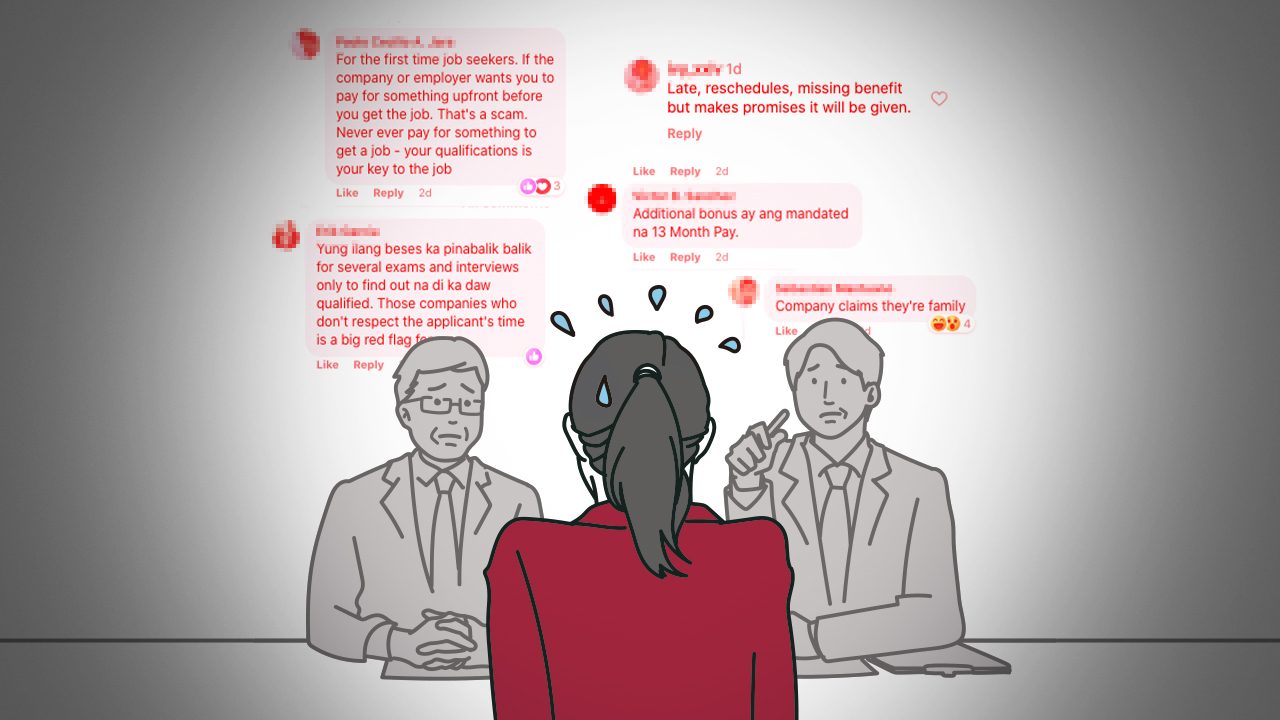
Whether you’re a fresh graduate or already an experienced career person, a toxic workplace is something that you’d definitely want to avoid when looking for a job.
Even though it’s a company that you’re really interested in or you’re in dire need of a job, you still want to make sure that the working environment of the company you’re applying for suits you. Which is why it’s important to note that job interviews are a two-way process.
Sure, it’s the time for potential employers to test if you’re qualified for a certain position, but take this chance also to assess if you’re fit for the culture and practice that they have. After all, you don’t want to quit in the first six months after realizing that your values and processes don’t align with your new company.
We asked our Rappler readers for some red flags to spot during the hiring process and here’s what they have to say:
Constant rescheduling and unclear timeline
Minor delays may be acceptable, but if your interviews are often rescheduled or they’re always late, or worse, repeatedly disappears from you during your sessions, then it just indicates a lack of respect for your time.
Remember that your time as an employee is just as valuable as anyone from the company. And if the potential employer can’t value your time even before you’re hired, then it’s possible that they won’t respect it once you already get the job.
“Those companies who don’t respect the applicant’s time is a big red flag for me,” one Rappler reader said. Another netizen also wrote: “Slow process and do not even give updates.”
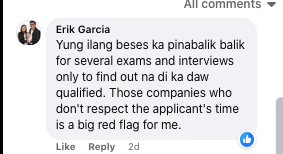

Rappler readers also noted that this could be exhibited when the company only tells an applicant that they’re not qualified after making them undergo several exams and interviews, or when the interviewer can’t provide a proper flow and duration for the hiring process.
Moreover, this could mean that the company doesn’t prioritize the position as they’re not eager to fill it up, or they’re just too disorganized to move things forward.
On the other hand, applicants should also be wary when companies rush them to make an immediate decision. If they already want you to be onboard as soon as possible but haven’t given you enough time to evaluate the offer, then best to think twice about what you’re signing up for.
Disrespects you and other people
It goes without saying that it’s not professional for any employer to badmouth their employees, current or not.
If your interviewer starts badmouthing the person who recently resigned after you asked them why the position is currently available, then take it as a sign that they could disrespect everyone in the company, including you.
Remember that employees leave jobs for many reasons, and employers should respect that. There’s no need for those who left to be maligned and disrespected when they can’t even defend themselves when the employer could just focus on explaining the details of the position, instead.
Additionally, talking poorly about their workmates is a sign of how they can’t handle conflicts and confidential matters appropriately, which could be a reflection of the company’s culture. Which is why it’s important to observe how the interviewers interact with each other or treat their co-workers when you’re around them.
This lack of respect could also trickle towards you during the interview process. If they made passing offensive comments (e.g. ageist, sexist, racist remarks) or kept on pushing some irrelevant questions, then ask yourself whether you’d like to work with someone who has a bad attitude.
Another sign of disrespect is when the interviewer doesn’t engage with you during the process. As this could mean that they’re really not interested in you or they already have someone else in mind for the process. “Talking to a recruiter/human resource person does not feel human at all,” one Rappler reader shared.
Lack of clarity and consistency
Again, interviews should be a two-way street. As an applicant, you should also be allowed to ask your own set of questions to gauge whether it’s something you’d like to pursue.
But if the employer looks annoyed or gets defensive and dismissive about your queries, then that’s another red flag as their evasiveness won’t help you make informed decisions about your career. Moreover, this also indicates that they don’t care about your thoughts and concerns. And if they’re already like this early in your supposed working partnership, there’s no assurance that they won’t act the same when you’re already an employee.
Make sure to note also whether they’re giving precise, clear, and consistent answers to your concerns, or their response about work culture, management style, salary, benefits, and reason for their high employee turnover vary and get more generic everytime.
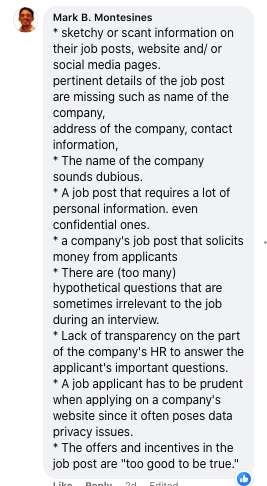
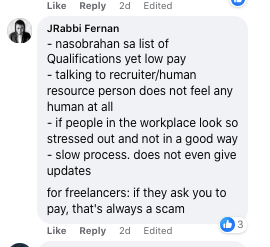
This also particularly applies to being clear about the job description. A Rappler reader noted that if “pertinent details of the job post are missing” or it’s a “sketchy” social media post, then be wary in pushing through with the application process.
When an interviewer can’t answer you about your daily responsibilities about the job, then it could signify their lack of understanding about the position.
Or if you apply for a specific position but the interviewer tells you that you’re better suited for a different role, one that you’ve never heard of, then applicants should also tread lightly. This could lead you to agreeing on a job that you have no clue about.
Drawn out process that asks for free work, or worse, money
When applicants start the hiring process, they should already be informed of the timeline and steps they’d have to take. This way, they’d have a better idea on what to expect and how things will move forward. Even if the company decides not to move forward with a candidates’ application, they should still be informed that they’re no longer being considered for the role.
Sure, hiring a fit candidate takes some time. But making them do 10 interviews – even for those applying for managerial positions – is just excessive. And worse, some companies even ask applicants for several outputs and money on top of these interviews.
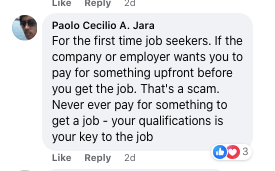
Yes, some roles require tests and assignments to assess an applicant’s skills. But if a company asks for multiple outputs that will take several hours, or days, from an applicant’s free time, then that’s just a roundabout way of exploiting them for free labor. Worse, some companies might even use these outputs for their own executions without even hiring the applicant. So it’s best that an applicant and a company should have an agreement on how they’ll use these works created during the hiring process.
A Rappler reader commented that a “job post that requires a lot of personal information, even confidential ones” is a red flag for them.
Meanwhile, another user advised: “For the first time job seekers, if the company or employer wants you to pay for something upfront before you get the job, that’s a scam. Never ever pay for something to get a job – your qualifications are your key to the job.”
‘We’re a family’
Sure, you’d prefer a comfortable and fun environment. But if the company keeps on pushing the idea of a family within the organization, then be careful. This could mean a lack of boundaries among the group.

Are there any red flags that you should be wary of during the application process? – Rappler.com
Add a comment
How does this make you feel?
There are no comments yet. Add your comment to start the conversation.